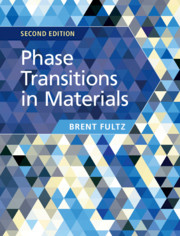Book contents
- Frontmatter
- Contents
- Preface
- Notation
- Part I Basic Thermodynamics and Kinetics of Phase Transformations
- Part II The Atomic Origins of Thermodynamics and Kinetics
- Part III Types of Phase Transformations
- 11 Thermodynamics and Phase Transitions at Surfaces
- 12 Melting
- 13 Solidification
- 14 Phase Transformations with Interfaces: 1. Microstructure
- 15 Phase Transformations with Interfaces: 2. Energetics and Kinetics
- 16 Spinodal Decomposition
- 17 Phase Field Theory
- 18 Method of Concentration Waves and Chemical Ordering
- 19 Diffusionless Transformations
- 20 Thermodynamics of Nanomaterials
- 21 Magnetic and Electronic Phase Transitions
- Further Reading
- References
- Index
16 - Spinodal Decomposition
from Part III - Types of Phase Transformations
Published online by Cambridge University Press: 24 April 2020
- Frontmatter
- Contents
- Preface
- Notation
- Part I Basic Thermodynamics and Kinetics of Phase Transformations
- Part II The Atomic Origins of Thermodynamics and Kinetics
- Part III Types of Phase Transformations
- 11 Thermodynamics and Phase Transitions at Surfaces
- 12 Melting
- 13 Solidification
- 14 Phase Transformations with Interfaces: 1. Microstructure
- 15 Phase Transformations with Interfaces: 2. Energetics and Kinetics
- 16 Spinodal Decomposition
- 17 Phase Field Theory
- 18 Method of Concentration Waves and Chemical Ordering
- 19 Diffusionless Transformations
- 20 Thermodynamics of Nanomaterials
- 21 Magnetic and Electronic Phase Transitions
- Further Reading
- References
- Index
Summary
Spinodal decomposition of a solid solution begins with infinitesimally small changes in composition. Nevertheless, there is an energy cost for gradients in composition, specifically the square of the gradient. This “square gradient energy” is an important new concept presented in this chapter, and it is also essential to phase field theory (Chapter 17). An unstable free energy function is a conceptual challenge, but it proves useful for short times. Taking a kinetic approach, the thermodynamic tendencies near equilibrium are used to obtain a chemical potential to drive the diffusion flux of spinodal unmixing. This chapter follows the classic approach of John Cahn by adding a term to the free energy that includes the square of the composition gradient. Lagrange multipliers are used in the diffusion equation for the chemical potential, and compositional unmixing is described by Fourier transformation. There is also an elastic energy that increases with the extent of unmixing, and gives the “coherent spinodal” on the unmixing phase diagram.
Keywords
- Type
- Chapter
- Information
- Phase Transitions in Materials , pp. 424 - 440Publisher: Cambridge University PressPrint publication year: 2020

